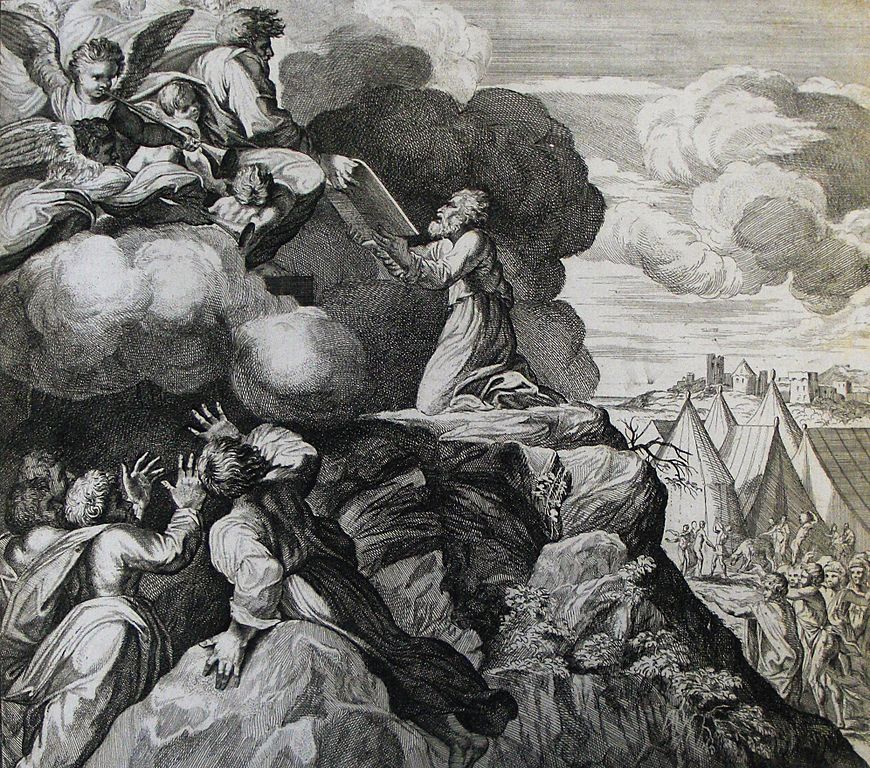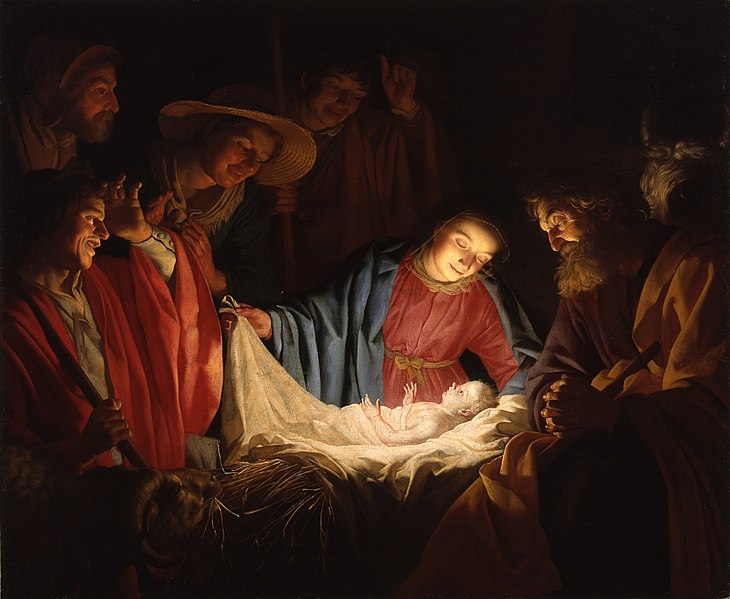Scripture readings: Isa. 61:10-11; 62:1-3; Ps. 148; Gal. 4:4-7; Luke 2:22-40 Sermon by Ted Johnston from Gal. 3:26-4:12a (drawing on the writings of John Stott, G. Walter Hansen and Gary Deddo)
Live Like Adult Children, Not Slaves
Introduction
Today (December 31), is the 7th day of Christmas in the Western Christian tradition. During this season, we are exploring the truth that with Jesus’ birth, a new day dawned for humanity. But do we understand fully the implications of Jesus’ first advent? Down through the ages, some Christians have not—they have erred by looking to the Law of Moses or other rules as the basis for their life in Christ.
Having encountered this error among Gentile Christians in Asia Minor, Paul wrote them the letter we know as Galatians. In its first three chapters, Paul points out that their attempt to earn God’s favor through obedience to the Law is wrong-headed, for in their union with Christ, by the Spirit, through faith, they already have received the covenant promise given to Abraham. Attempts to secure that promise by observing the Law are therefore foolish. Note Paul’s summary statement at the end of chapter 3:
So in Christ Jesus you are all children of God through faith, for all of you who were baptized into Christ have clothed yourselves with Christ. There is neither Jew nor Gentile, neither slave nor free, nor is there male and female, for you are all one in Christ Jesus. If you belong to Christ, then you are Abraham’s seed, and heirs according to the promise. (Gal. 3:26-29)
The Law of Moses was temporary
In chapter 4, Paul emphasizes the temporary nature of the Law of Moses, which was added to the covenant God made with Abraham to form what Scripture calls the old covenant. Paul shows that life under that form of the covenant was a type of slavery, which is to be abandoned by Christians in order to live in the freedom that is theirs as mature children of God under the new covenant:
What I am saying is that as long as an heir is underage, he is no different from a slave, although he owns the whole estate. The heir is subject to guardians and trustees until the time set by his father. (Gal. 4:1-2)
The Law of Moses was given to Israel under the old covenant in order to illustrate God’s grace in the coming Messiah. But with Jesus’ death and resurrection, this God-given purpose of the Law was fulfilled and the old covenant came to an end. Paul makes this point about the temporary nature of the Law by noting that it was like a guardian of a child. Under that guardianship, the child was moving toward the time when he would receive his full inheritance. The old covenant is thus portrayed as temporary, replaced by the new covenant, which comes at maturity.

Don’t misuse the Law
So also, when we were underage, we were in slavery under the elemental spiritual forces of the world. (Gal. 4:3)
Paul then refers to the Galatians’ wrong-headed misuse of the Law as slavery to “elemental spiritual forces of the world.” In verse 9 these forces are called “weak” because the Law has no strength to save, and “miserable” (“beggarly” in the RSV) because it has no wealth to bestow. “Elemental” has two possible meanings (and Paul may intend both):
- It can mean “elementary things,” like the ABC’s learned in kindergarten. In this way Paul is likening the Law to rudimentary education preceding maturity.
- It can mean “elemental spirits” associated in paganism with the physical elements (earth, fire, air and water) and the heavenly bodies (sun, moon and stars). This second definition fits verse 8 where we are said to have been “slaves to those who by nature are not gods,” namely evil (elemental) spirits.
Paul’s point is that by seeking to live under the Law of Moses, the Galatian Christians, who were largely Gentiles, were returning to a way of approaching God that was functionally equivalent to their former paganism. But Christ, argues Paul, has set us free from all that. As Christians, we are not called upon to seek God’s favor through rituals (specifically rituals of the Law of Moses under the old covenant). As mature children, our identity and receipt of God’s favor is not from what we do, but because of who God is and what God has done for us in and through Christ. That is the gospel; and the Galatians were abandoning it for legalism and superstition.
The old covenant has ended
But when the set time had fully come, God sent his Son, born of a woman, born under the law, to redeem those under the law, that we might receive adoption to sonship. (Gal. 4:4-5)
Here Paul notes that the new covenant replaced the old covenant (with its reliance on the Law of Moses) at a specific moment in history—”when the set time had fully come.” Humanity’s bondage under the Law of Moses thus continued for about 1,300 years. It was a long and arduous time of being immature and under the age of adulthood. But, at last, the time came when the children should attain their majority (legal age of maturity) and thus should inherit the promise, having been freed from guardians and trustees. This “fullness of time” (RSV) arrived at Christ’s advent, when “God sent his Son, born of woman, born under the law, to redeem those under the law, that we might receive adoption to sonship.”

God’s purpose: to redeem and adopt
Notice that God’s purpose was both to redeem and to adopt—not just to rescue from slavery, but to make slaves into his own children. The metaphors of redemption and adoption come from Roman law whereby a wealthy childless man might take into his family a slave youth who thus ceased to be a slave and became an adopted son and heir.
Paul is emphasizing that the one whom God sent to accomplish our redemption was perfectly qualified to do so. He was God’s Son. He was also born of a human mother, so that he was human as well as divine, the one and only God-man. And he was “born under the law,” that is, of a Jewish mother, into the Jewish nation, subject to the Jewish Law of Moses, which was central to the old covenant. Throughout his life, Jesus submitted to all the requirements of the Law and succeeded where all others before and since have failed—he perfectly fulfilled the righteousness of the Law. So the divinity of Christ, the humanity of Christ and the righteousness of Christ uniquely qualified him to be humankind’s redeemer.
Through a double sending: the Son and the Spirit
Because you are his sons, God sent the Spirit of his Son into our hearts, the Spirit who calls out, “Abba, Father.” (Gal. 4:6)
The Greek verbs translated “sent” in verses 4 and 6 are the same word in the same tense. There was, therefore, a double sending forth from God the Father. Note the Trinitarian reference: First, God sent his Son into the world; second, he sent his Spirit into our hearts. And entering our hearts, the Spirit immediately began to cry out “Abba! Father!” Abba is the word Jesus himself used in prayer to God the Father.

Thus God’s purpose was not only to secure our sonship and our legal inheritance by his Son, but to assure us of it by his Spirit. He sent his Son that we might have the objective “status” of sonship, and then sent his Spirit that we might have the subjective “experience” of that sonship—that we might know of and then live in accordance with who we truly are in Christ—God’s children.
It is “because you are sons” that God has sent the Spirit of his Son into our hearts, says Paul, and no other qualification is needed. Therefore, there is no need to recite some formula, to strive after some experience, or to fulfill some extra condition (such as obedience to the rituals of the Law of Moses). Paul says clearly, that “because” we are God’s children, God has sent his Spirit into our hearts. And the way he assures us of our sonship is not by some spectacular gift, sign or experience, but by the quiet inward witness of the Holy Spirit who leads us to pray, “Abba! Father!”
So you are no longer a slave, but God’s child; and since you are his child, God has made you also an heir. (Gal. 4:7)
Don’t be fooled!
This radical change in status is not the result of our own merit nor our own effort—it is not the result of adherence to the Law of Moses—it is because of what God has done, through his initiative, who first sent his Son to die for us and then sent his Spirit to live in us.
Formerly, when you did not know God, you were slaves to those who by nature are not gods. But now that you know God—or rather are known by God—how is it that you are turning back to those weak and miserable forces? Do you wish to be enslaved by them all over again? (Gal. 4:8-9)
Paul points out the folly of turning back to the Law of Moses. He contrasts the Galatians’ former ignorance and enslavement within paganism with their present state as adult children of God, describing them as people who have come to know God—or, more accurately, are known by him. The latter phrase eliminates any presumptuousness and recognizes God’s initiative in our redemption.
Turn to God and away from self
The advent of Christ, which we have just recently celebrated at Christmas, is the great turning point in redemption history. It is a point in which we are called to turn away from ourselves—from what we are, from what we are able to do—and turn to God, to who and what God is, and to what God in his love has done for us in Christ.
You are observing special days and months and seasons and years! (Gal. 4:10)
Paul makes it clear that the law he is referring to is none other than the Law of Moses, which has at its core the observance of “special days and months and seasons and years.” This terminology, which is taken from the Greek translation of the Old Testament (the Septuagint) is a reference to the weekly, monthly and annual worship rituals specified for Israel under the Law of Moses. Paul’s point is that these gentile Christians in Galatia were leaving behind the free and joyful communion of children with their heavenly Father and substituting the outmoded religion of the old covenant—doing so was nothing more than religious formalism and legalism that was functionally equivalent to pagan superstition and thus a form of slavery.
I fear for you, that somehow I have wasted my efforts on you. (Gal. 4:11)
Paul fears that all the time and trouble he has spent over them has been wasted. Instead of growing in the liberty with which Christ, through the Spirit, has set them free, they have slipped back into legalism, which is a form of bondage.
I plead with you, brothers and sisters, become like me, for I became like you. (Gal. 4:12a)
Paul appeals to these Galatian Christians with deep feeling and tenderness, noting that when he first visited them in the Province of Galatia, he did not stand aloof or separate from them, but identified himself with them. Although he was a Jew, he lived like the Gentiles that they were. How odd, then, that they were now seeking to live like Jews!
Conclusion
As believers, we are not slaves, nor are we underage children—we are adult children of God living under the new covenant, not the old covenant (which includes the Law of Moses). And so we must not be tempted to return to the Law. Doing so is a distraction at best, and at worst a form of bondage. Instead, let’s understand and fully embrace the freedom that we have as mature children of God—freedom to live by the Spirit of God, in union with the Son of God, under the grace of God. Amen!



Ted, on page 4 of the sermon for December 31, it reads, “But, at last, the time came when the children should attain their majority – be freed from guardians and trustees and inherit the promise.”
Should this read, “…the children should attain their MATURITY”?
Thanks
Ken Emerson
Ken, in this case, “majority” is the correct word. The age of majority refers to legal recognition that one has grown into an adult. In that sense it is roughly equivalent to reaching maturity.
Ted, thanks for reminding us that we are God’s children through the miracle of the Incarnation, and because the Father sent the Spirit into our hearts, and not because of anything we have done or will do. Now we can live in freedom as God’s children!